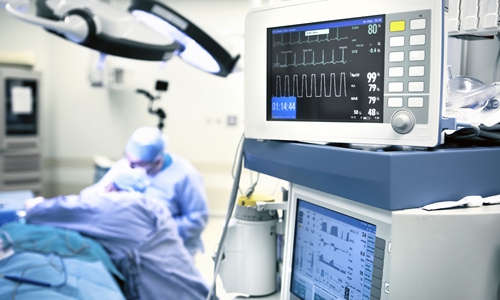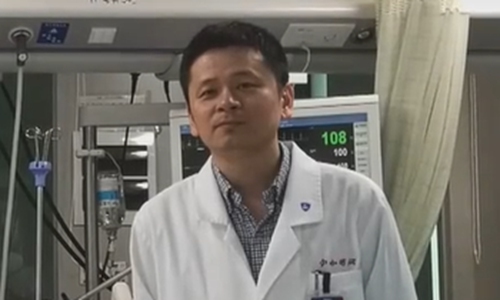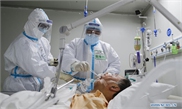Although he was given the title "Master of ECMO," Zhong Ming, an intensive care specialist sent to Wuhan from Shanghai, said that in the long weeks he spent treating the most critical COVID-19 patients, he found the treatment was not a panacea.
Appointed by the National Health Commission, Zhong, director of the critical care medicine department of Zhongshan Hospital affiliated to Fudan University, headed to Wuhan, capital of Central China's Hubei Province on January 23. He was sent to the ICU department of Wuhan Jinyintan Hospital, the first clinic in the city to receive COVID-19 patients.

Tough beginning
During his work at Jinyintan Hospital, there were only three ICU wards in the hospital with 16 beds, which was far from enough to receive the influx of critical patients. Later, the hospital adapted another two floors into isolation wards for critical patients.
With the critical wards full of patients, he said he understood that this time, it would be "really difficult."
Zhong led a team of doctors and was responsible for a makeshift ICU inpatient area.
Often, the condition of the patients transferred to them had become critical. "Every patient had been through treatments that didn't work before they were transferred to us. It was a hard struggle for us doctors," Zhong said.
Having treated people with SARS in 2003 and providing medical aid in the aftermath of the 2008 Wenchuan earthquake in Sichuan Province, Zhong has racked up more than two decades' experience in treating critical patients.
With his breadth of experience in treating critical patients, Zhong was dubbed the "ECMO master."
ECMO, Extracorporeal membrane oxygenation, is a treatment where a machine pumps and reoxygenates the blood outside the body to give the lungs and heart a rest, similar to that used in heart bypass surgery.

Zhong found the situation in Wuhan was more severe than he ever could have imagined. "COVID-19 is a totally new disease to humans and it was difficult to pull back critical patients from death," Zhong said.
Zhong recalled that in the beginning, the novel coronavirus had caught them off guard. Their previous experience was not working in Wuhan because the medical resources were overwhelmed by the numbers of patients and medics knew nothing about the mechanism of the strange disease.
Zhong found that some patients who were in a stable situation and could communicate, died suddenly the next day. "It was beyond our knowledge of diseases," he said.
Many people expected a lot from ECMO, calling it the "the last straw" to save lives. But Zhong said at the beginning of February that ECMO is not almighty and its effect varies from patient to patient.
"Most critical patients are elderly and they usually become critical after two or three weeks which is like Systemic Inflammatory Response Syndrome (SIRS) or an inflammatory response," he said. "Patients show mild symptoms in the first week before turning critical in the second week, which not only affects the lungs but also causes multiple organ dysfunction syndrome and the life saver ECMO did not have the effect we expected."
After using ECMO on different patients, Zhong's team found that if a patient suffers only from respiratory failure, lung failure or heart failure, ECMO works well to support cardio-pulmonary function. But if the patient has multiple organ failure, it is hard to use ECMO to support cardio-pulmonary failure.
Zhong said that one 83-year-old woman who was in critical condition when she came to Zhong's team could not breathe with the oxygen tube. Zhong used a non-invasive ventilator to adjust her breath and avoid tracheal intubation. In the treatment, the woman improved and could breathe with a nasal tube.
The woman has recovered from COVID-19 and was transferred to a non-critical care ward.
Dawn of success
After Zhong had been able to explore treatment options for a couple of weeks, the situation improved.
Although still tough, Zhong found the recovery rate was increasing as healthcare workers sought effective methods and learned what worked. Especially after optimizing treatment procedures, the team could work more effectively which benefited treatment.
Some patients in the ICUs were determined, their eyes showing their will to survive. A critical patient struggled to give Zhong a thumbs up, and said "thank you for coming to Wuhan and thank you for helping us."
As more than 40,000 medical staff were deployed to Hubei and as equipment and drugs arrived, the city which had been at the brink, started to turn a corner. In Jinyintan Hospital, Zhong saw that more patients were discharged, which encouraged and gave confidence to all the healthcare workers. He identified three factors in curing critical cases.
First, doctors should get to know more about the disease, take measures a step ahead of the disease, and not wait until it is too late to take remedial measures. Second, after the medical aid arrived, medical care capacity was improved. Third, categorization and isolation should be clear and patient transfer should be in time.
He said that the pandemic alerted people that we need a mature system to cope with emergent public health events. In regard to critical care medicine, the country should be prepared in terms of professional skills, procedures and regulation making and supply of medical equipment.
Zhong's daughter plays piano. Every night, she played piano for her father through video chat, which helped revive him from the stressful work of the day.
"Dad, you said that you are a good doctor but why there are people dying?" his daughter asked him one day.
Facing the innocent question, Zhong had no answer but a bitter smile. Although his team knows about the disease, the mechanism of how patients fall into critical condition was still unknown.
On the afternoon of April 6, Zhong returned to Shanghai along with other medics from the city.
"[After the pandemic,] I want to go to work as usual, I want to spend a weekend like before to feel life once again," Zhong said when asked about his plan after the pandemic.
"Before, I didn't realize that every single day is important and how precious the peaceful ordinary life is," he said.
Global Times - Agencies
Appointed by the National Health Commission, Zhong, director of the critical care medicine department of Zhongshan Hospital affiliated to Fudan University, headed to Wuhan, capital of Central China's Hubei Province on January 23. He was sent to the ICU department of Wuhan Jinyintan Hospital, the first clinic in the city to receive COVID-19 patients.

Photo: VCG
Tough beginning
During his work at Jinyintan Hospital, there were only three ICU wards in the hospital with 16 beds, which was far from enough to receive the influx of critical patients. Later, the hospital adapted another two floors into isolation wards for critical patients.
With the critical wards full of patients, he said he understood that this time, it would be "really difficult."
Zhong led a team of doctors and was responsible for a makeshift ICU inpatient area.
Often, the condition of the patients transferred to them had become critical. "Every patient had been through treatments that didn't work before they were transferred to us. It was a hard struggle for us doctors," Zhong said.
Having treated people with SARS in 2003 and providing medical aid in the aftermath of the 2008 Wenchuan earthquake in Sichuan Province, Zhong has racked up more than two decades' experience in treating critical patients.
With his breadth of experience in treating critical patients, Zhong was dubbed the "ECMO master."
ECMO, Extracorporeal membrane oxygenation, is a treatment where a machine pumps and reoxygenates the blood outside the body to give the lungs and heart a rest, similar to that used in heart bypass surgery.

hong Ming seen in the documentary Hero City produced by the Xinhua News Agency Photo: Screenshot from documentary
Zhong found the situation in Wuhan was more severe than he ever could have imagined. "COVID-19 is a totally new disease to humans and it was difficult to pull back critical patients from death," Zhong said.
Zhong recalled that in the beginning, the novel coronavirus had caught them off guard. Their previous experience was not working in Wuhan because the medical resources were overwhelmed by the numbers of patients and medics knew nothing about the mechanism of the strange disease.
Zhong found that some patients who were in a stable situation and could communicate, died suddenly the next day. "It was beyond our knowledge of diseases," he said.
Many people expected a lot from ECMO, calling it the "the last straw" to save lives. But Zhong said at the beginning of February that ECMO is not almighty and its effect varies from patient to patient.
"Most critical patients are elderly and they usually become critical after two or three weeks which is like Systemic Inflammatory Response Syndrome (SIRS) or an inflammatory response," he said. "Patients show mild symptoms in the first week before turning critical in the second week, which not only affects the lungs but also causes multiple organ dysfunction syndrome and the life saver ECMO did not have the effect we expected."
After using ECMO on different patients, Zhong's team found that if a patient suffers only from respiratory failure, lung failure or heart failure, ECMO works well to support cardio-pulmonary function. But if the patient has multiple organ failure, it is hard to use ECMO to support cardio-pulmonary failure.
Zhong said that one 83-year-old woman who was in critical condition when she came to Zhong's team could not breathe with the oxygen tube. Zhong used a non-invasive ventilator to adjust her breath and avoid tracheal intubation. In the treatment, the woman improved and could breathe with a nasal tube.
The woman has recovered from COVID-19 and was transferred to a non-critical care ward.
Dawn of success
After Zhong had been able to explore treatment options for a couple of weeks, the situation improved.
Although still tough, Zhong found the recovery rate was increasing as healthcare workers sought effective methods and learned what worked. Especially after optimizing treatment procedures, the team could work more effectively which benefited treatment.
Some patients in the ICUs were determined, their eyes showing their will to survive. A critical patient struggled to give Zhong a thumbs up, and said "thank you for coming to Wuhan and thank you for helping us."
As more than 40,000 medical staff were deployed to Hubei and as equipment and drugs arrived, the city which had been at the brink, started to turn a corner. In Jinyintan Hospital, Zhong saw that more patients were discharged, which encouraged and gave confidence to all the healthcare workers. He identified three factors in curing critical cases.
First, doctors should get to know more about the disease, take measures a step ahead of the disease, and not wait until it is too late to take remedial measures. Second, after the medical aid arrived, medical care capacity was improved. Third, categorization and isolation should be clear and patient transfer should be in time.
He said that the pandemic alerted people that we need a mature system to cope with emergent public health events. In regard to critical care medicine, the country should be prepared in terms of professional skills, procedures and regulation making and supply of medical equipment.
Zhong's daughter plays piano. Every night, she played piano for her father through video chat, which helped revive him from the stressful work of the day.
"Dad, you said that you are a good doctor but why there are people dying?" his daughter asked him one day.
Facing the innocent question, Zhong had no answer but a bitter smile. Although his team knows about the disease, the mechanism of how patients fall into critical condition was still unknown.
On the afternoon of April 6, Zhong returned to Shanghai along with other medics from the city.
"[After the pandemic,] I want to go to work as usual, I want to spend a weekend like before to feel life once again," Zhong said when asked about his plan after the pandemic.
"Before, I didn't realize that every single day is important and how precious the peaceful ordinary life is," he said.
Global Times - Agencies

